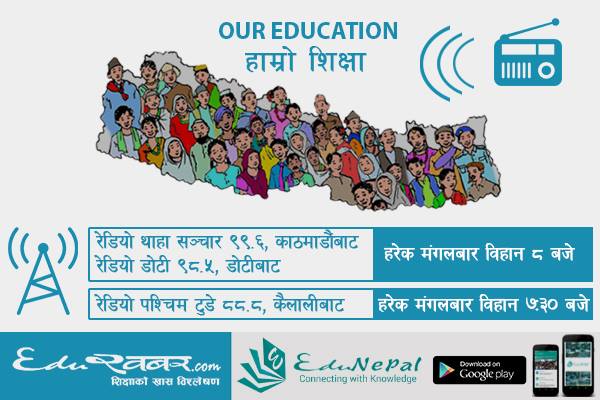
Kathmandu - Experts have suggested that local resources should be identified and used for strengthening the quality of public education in the country.
Their opinion comes amid assumption of responsibilities by the new elected representatives of various local bodies in different parts of the country. The new constitution entrusts local bodies the authority to maintain high school level public education.
In an interaction organized by edukhabar.com and Action Aid Nepal entitled 'Tax Exemption and Investment on Education in Nepal,' senior education officials, experts and practitioners stressed the need of a coordinated approach to improve quality education.
Former Vice Chancellor of the Tribhuvan University Professor Kedarbhakta Mathema said the government should take concrete steps for improving the public education. "The government's promise of free education still looks only a slogan. There are still immaturities and there is a need of a clear commitment to help local bodies properly run the school education in the new federal structure that we have already adopted," he added.
Mathema also stressed that the local bodies should be more empowered and asked to mobilize the local resources for providing the basic and high school level education to people. For that, he said revenues generated from local resources can be one of the major sources for funding the education.
Academician Dr. Manaprasad Wagle said the local bodies should make the maximum use of their resources and increase their investment in education.
"There are four types of grant stipulated by the constitution. If the local bodies receive adequate support, it will be really easy for them to fulfill their responsibility," he said adding that there was a need to trust the new local bodies rather than questioning their abilities.
Economist Dr. Dilli Khanal said the local bodies should accord top priority to transparency and accountability to ensure quality public education."We are not being able to ensure sufficient investment in public education. The quality of education has suffered from this poor investment."
Educationalist Dr. Sushan Acharya questioned the current allocation of resources for education and warned that the investment on education should not only focus on building schools and providing salaries to teachers. Expert on local governance Dr. Mukti Rijal urged for ensuring community participation to monitor the quality of public education.
Action Aid Nepal's Country Director Bimal Phnuyal stressed the need of overall reform in education. With constitution entrusting more power to local bodies, he argued that it is the right time to start a new initiative from all relevant stakeholders for achieving that goal. Nanda Kumari Maharjan, the principal of Janasewa Madhyamik Bidhyala Kirtipur said proper monitoring and supervision would ensure effective spending of budget and other resources allocated for schools.
Early childhood development expert Minakshi Dahal suggested the need to make more investment in early childhood education arguing that it would multiply the outcome. Researcher Pramod Bhatta said there was the need to have a uniform definition of public education and all the three units –centre, province and local bodies—should equally take up the responsibility.
Spokesman of the Education Ministry Joint Secretary Hariprasad Lamsal argued that the government was trying its best despite resource constraints to improve the quality of education. He also said both the central and the local government will work collectively to improve the quality of high school level education.
(This report is the part of a radio programme entitled 'Hamro Sikshya' which discusses the opportunities and challenges in public education in the new federal setup. The programme is produced by edukhabar.com with the support of Action Aid Nepal. It is aired from Radio Paschim Today based in Dhangadi, Radio Doti based in Doti and Radio Taha Sanchar based in Kathmandu. The radio programme can also be tuned through this link: http://www.edukhabar.com/program/2 and also through aneroid app Edunepal.)
प्रतिक्रिया